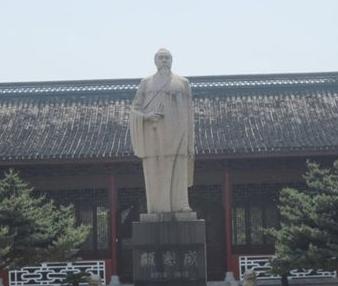Gu Xiancheng often spoke bluntly, offended the magnates, and angered The Ming Dynasty, was dismissed from his post and returned home, and later repaired the Donglin Academy with his younger brother Gu Yuncheng, where he publicized his political ideas, recruited people with lofty ideals, and developed into the famous "Donglin Party".

Statue of Gu Xiancheng
Gu Xian became something so powerful
Gu Xiancheng single-handedly founded the Donglin Party, which resisted dictatorship and was honest and upright, and wrote a strong stroke in history. In those days, we could not demand that he be able to create parliamentary systems in countries such as Britain and France, and his ideas against dictatorship were already valuable.
Gu Xiancheng was driven home, not only did not fade out of people's vision, but on the contrary, his reputation soared, and he became a representative of the rebellion against the imperial power, and everyone elected him to come out of the mountain again. It can be seen that during the Wanli period, he was still relatively polite to the minister, which was really a hundred times better than Zhu Yuanzhang. If Zhu Zhongba's stubbornness reincarnated, the ten Gu Xiancheng would also be beheaded, and he wouldn't want to make a fuss at all.
After Gu Xiancheng returned home, his younger brother Gu Yuncheng and fellow villager Gao Panlong also resigned and returned home. The official is wrong, but the political ambitions in the chest cannot but be realized. Three doctors who are concerned about state affairs and have a large number of fellow scholars have a plan: run a college to give lectures! With their prestige, it was not difficult to set up a college, and Donglin Academy was soon established, and the Donglin Party was also formally formed. In the decades that followed, the Donglin Party gathered the best and most ambitious scholars of the time, radiating incredible magic. The political views it propagated against dictatorship and the high wind and bright festivals that ning wei yu shattered became a kind of faith, and many scholars and masters rushed to climb first, became its loyal followers, and finally formed a powerful political force, large enough to control the situation of the Ming Empire.
Because he was always the mastermind behind it, he was able to die well. But most of the Donglin Party and its followers, which he founded, were not so lucky, and many people not only died extremely tragically, but were also cursed by the castrated party and the Nine Tribes, which was unspeakably miserable. This will be described in detail in the accounts of Yang Lian, Wang Yanshen, and others.
Gu Xiancheng commented
Gu Xiancheng
"History of Ming": Xian Cheng's posture is absolutely extraordinary, and he has the ambition to learn from a young age. Ji Zhi Liju, Yi Qinjing research, and strive to dispel Wang Shouren's saying that "there is no goodness and no disgusting body".
Fan Shuzhi: Gu Xiancheng passed away in a wave of slander.
Cambridge History of the Ming Dynasty of China: Gu Xiancheng (1550-1612), the main founder of the Donglin Movement, as a senior official in the bureaucracy, successfully obstructed the appointment of a Hanlin scholar to lead his own ministry, on the grounds that all university scholars were already members of Hanlin and that controlling some of the major positions in the outer court by such an exclusive inner court group would be detrimental to the interests of a sound government.
Gu Xiancheng founded Donglin Academy, initiated the Donglin Conference, promoted the upsurge of practical thought, and wrote a famous couplet at Donglin Academy: "The sound of wind and rain reading, the sound of sound into the ears..." attracted many people with lofty ideals, and was called "Donglin Party" by opponents.
Gu Xiancheng and Donglin Academy
Gu Xiancheng returned to his hometown and decided to engage in lecturing while promoting his political ideas. It happened that there was a Donglin Academy in Wuxi where the Song Dynasty scholar Yang Shi had taught, and he and his younger brother Gu Yuncheng proposed to repair it. The maintenance of the academy was funded and supported by many local people, as well as the prefect of Changzhou and The Zhixian county of Wuxi, and the academy was restored in 1604 (the thirty-second year of the Wanli calendar). In October of the same year, Gu Xiancheng, together with Gu Yuncheng, Gao Panlong, An Xifan, Liu Yuanzhen, Qian Yiben, Xue Shijiao, Ye Maocai (then known as the Eight Gentlemen of Donglin), and others, initiated the Donglin Conference and formulated the Donglin Convention, which stipulated that the general meeting should be held once or twice a year and once a month.
In the courtyard, there are existing buildings such as Stone Monument Fang, Yimen, Lize Hall, Stele Pavilion, Daonan Ancestral Hall, etc., which contain Gu Xiancheng's famous joint: "The sound of wind and rain reading, the sound of sound into the ears; family affairs, state affairs, world affairs, everything is concerned."
Donglin Academy lectured and discussed politics, attracting many people with lofty ideals, including some officials who were belittled for criticizing the government. Regardless of the distance of the road, they flocked to and from the place, and the number of people was so large that the school buildings of Donglin Academy could not be accommodated.
Gu Xiancheng once said: "As an official in the imperial court, the ambition is not in the emperor, in the border areas, the ambition is not in the people's livelihood, living under the water's edge, the ambition is not in the world, and the gentleman does not do this." In addition to his lectures, he often discussed the politics of the dprk and evaluated the characters. The people of the imperial court admired his demeanor and echoed him from afar. As a result, Donglin became famous, and there were many people who hated it. Thus being called the "Donglin Party" by their opponents.